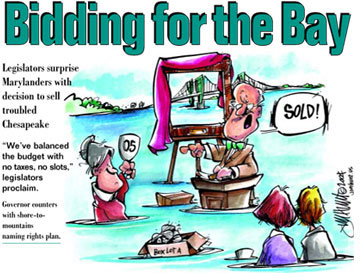In a stunning development that caught Marylanders, the federal government and the environmental community off guard, the Maryland Legislature voted in secret session March 27 to authorize the state to sell Chesapeake Bay.
Sources close to the vote say the catalyst was a message passed to Senate President Thomas V. Mike Miller by an undisclosed whistle blower that the federal government was poised “to swoop in and take over the Bay.”
The state’s decision to sell the Bay was a preemptive strike against the federal government.
“Before they seize Chesapeake Bay,” Miller told Bay Weekly in an exclusive interview, “we figured we could benefit by selling it first to a private investor.”
How the Bay will be sold is still up for discussion, but according to a copy of the resolution obtained by Bay Weekly, some lawmakers suggested following Gov. Robert Ehrlich’s example and placing the Chesapeake on eBay. Others want to gather potential bidders and let them “fight it out” in a public auction.
The method for the sale is not the only point of contention, according to transcripts from the debate before the March 27 vote obtained by Bay Weekly. The vote to “do something” was unanimous, but what that “something” is is still up for debate.
Right now it’s only a matter of how they’re going to proceed. As for getting rid of it, they’re all in agreement.
Lawmakers have scheduled a Good Friday Summit in Ocean City on April 9 to work out the details.
Many Birds with One Stone
Legislators agree that getting rid of the Bay — whether the federal government takes it over or it’s sold to investors — would be a relief to them as well as a boon to the state.
Many lawmakers who have for years walked the fine line between what is good for Maryland and what is good for the Bay — not always mutually exclusive issues — said the decision took a load off their minds.
“Now that we don’t have to worry about the Bay,” said Del. Bob Costa (R, Anne Arundel), “We can set up a toll booth in the shipping channel and use the proceeds for education.”
The benefits to education were also on the mind of a Baltimore lawmaker, who spoke on the condition of anonymity. “Thank God. I couldn’t tell an Ariakensis oyster from a rockfish, anyway,” said the fed-up legislator. “We can move on now and worry about important things, like bailing out Baltimore schools.”
The majority of lawmakers, according to the March 27 transcripts, was also looking forward to the end of the parade of scientists coming into their committees to talk about nutrient runoff and “all that other crap.”
Maryland’s Rosier Future
An added bonus to selling the Bay is the financial windfall for the state.
According to the documents obtained by Bay Weekly, the starting bid on the Bay will be $165 million, the sum proposed in tax increases this year. Experts expect bidding to double at least three times to over one billion dollars.
“It’s prime real estate,” a New York developer and television star told Bay Weekly on the condition his name not be used “for a change.”
With the increased revenue, state programs on the brink of extinction can be saved; issues like taxes and slots are resolved without the infighting that has plagued Annapolis during the past two legislative sessions; and the surplus can go to fund schools and provide much-needed services like health care for Marylanders and no-cost tuition for incoming college students.
“Now that we have enough money to buy up all the land we need to save the Bay,” said Del. Virginia Clagett (D, Anne Arundel), “we don’t have a Bay anymore.”
The bonus cash in state coffers was not lost on state lawmakers or staffers responsible for the long line of lobbyists circling the State House.
Legislators are scheduling a special session to organize the sale of the Bay. To avoid the intense media coverage sure to descend on the capitol, the transcripts show the legislators — demonstrating amazing foresight — voted to hold the session on an undisclosed island in the Bahamas.
“We can afford it now,” one lawmaker said.
Not So Fast
U.S. Congressman Wayne Gilchrest, an environmentalist and Republican chair of the House Subcommittee on Fisheries Conservation, Wildlife and Oceans, announced through a spokesman that he would attempt to block the state sale. “He will go before the committee and try and stop the action to make sure the federal government gets its fair share of the revenue,” said Tony Caligiuiri, Gilchrest’s spokesman.
Angry legislators bristled at the congressman’s plan, vowing to take the matter to court.
“There is no way we’re going to let all this money go,” said Costa.
 The General Assembly has moved forward with the plan, opening an account on eBay and issuing a statement saying in part, that “the Chesapeake Bay is Maryland’s and we will do with it whatever we want … until the highest bid comes in.”
The General Assembly has moved forward with the plan, opening an account on eBay and issuing a statement saying in part, that “the Chesapeake Bay is Maryland’s and we will do with it whatever we want … until the highest bid comes in.”
Trying to diffuse the controversy, Gov. Robert Ehrlich stepped in with a plan of his own.
“What we want to do,” Ehrlich told Bay Weekly, “is to sell the naming rights to some of Maryland’s monuments.”
Landmarks are targeted by the governor, who came up with the idea in a conversation about sports stadiums named for corporations while playing golf with Washington Post sportswriter Tony Kornheiser. Ehrlich has already worked out the skeleton of the deal with a supermarket chain. “Just imagine: the Food Lion Bay Bridge. You can use your bonus card to cross and save 10 percent,” said Ehrlich.
It’s a win-win plan, the governor explained: Maryland can bring in the needed revenue with the naming rights, and the federal government can take the Bay off our hands while preserving the state’s relationship with the federal government.
“Just think, we can move from the Bay Bridge to the Harbor Tunnel sponsored by Exxon, to the BB&T Rt. 50, Roll Back Prices at Wal-Mart’s Calvert Cliffs and the Comcast City Dock. There’s no reason to stop. I can even name a road after Kendel, Joshua and Drew. If Schaefer can do it, why can’t we?” Ehrlich told Bay Weekly.
There was also talk of a corporate sponsorship for Baltimore City, but no bids have come in as of press time.
Bay Futures
Bay Weekly has learned that a firm for the Netherlands interested in buying the Bay for a tourist attraction is ready to begin airing television commercials as early as this weekend.
“We know we can win over Marylanders heart and soul,” said Eibin Föelyn, a spokesman for the Dutch firm We’re More than Just Wooden Shoes and Windmills, LLC.
According to the 90-second ad, WMJWSW promises to provide “year-round fun for the whole family without all the icky stuff.”
Travel experts say with the harsh Maryland winters and cold Bay temperatures the only way to guarantee year-round use of the Bay is to move it south.
“That’s just ridiculous,” said Föelyn. “How can you move the Chesapeake Bay?”
Instead, WMJWSW intends to encase the Bay in a temperature-controlled dome and set the thermostat at 78. The next step is restocking the Bay with animals “more in tune with family entertainment,” Föelyn said, “like dancing dolphins, whales that do tricks and seals people can ride.” Jellyfish will be eliminated.
Föelyn would neither confirm nor deny a persistent rumor that a theme park based on Chessie the Manatee is in the works.
As for the topography, the small islands that dot the Bay “just slow boaters down. With pontoon rentals a big source of our income, we’ll get rid of them,” Föelyn said.
What will such a plan do to the Bay’s unique and sensitive ecology?
“That’s what’s brilliant about our plan,” chuckled WMJWSW’s Föelyn. “People don’t have to worry about wetlands and critical areas anymore. We can just bulldoze them to make room for the hotels and suntan lotion stands.”
Environmental Concerns
As whispers of the deal spread through the environmental community, the reaction was predictable. Groups who worked for years trying to preserve the Bay were left speechless as well as unemployed.
Chesapeake Bay Foundation refused to comment.
Others, however, were mixed in their reaction.
U.S. Naval Academy professor Howard Ernst, author of the whistle-blowing Chesapeake Bay Blues, called the decision true to form. “Perhaps next year they can sell out public air and solve our air pollution problems,” he said as he loaded his belongings in a U-Haul and packed up for his cabin in the mountains of Montana.
Not every Bay advocate was critical.
“I am thrilled with the state’s decision to sell off Chesapeake Bay. It will really take a lot off of our plate here at the Maryland League of Conservation Voters,” said executive director Susan Brown. “Next they should look at auctioning off the rest of the state’s impaired waterways, forests, farms and endangered species.”
Many are now reloading for a different fight.
 “An interesting aspect of the proposal,” said the Naval Academy’s Ernst, “is that it would give private citizens legal standing to sue the EPA for not enforcing the Clean Water Act. That’s a step the state has been unwilling to take in its role as caretaker of the Bay.”
“An interesting aspect of the proposal,” said the Naval Academy’s Ernst, “is that it would give private citizens legal standing to sue the EPA for not enforcing the Clean Water Act. That’s a step the state has been unwilling to take in its role as caretaker of the Bay.”
Excited by the loophole, environmentalist geared up for their new fight and new revenue stream.
Lawyers were excited by the prospects of large settlements as well. Many were seen scouring through mountains of books at law libraries for precedent to force the federal government to clean up the Bay. As they worked, they talked on cell phones with their realtors, negotiating on the waterfront property sure to explode in value.
Citizens Respond
Citizen reaction to the proposed sale of the Bay is fierce and geographically divided.
“We’ve got our own problems,” responded a Baltimore resident to Bay Weekly’s call. Police sirens blared in the background.
Westerner Marylanders were excited by the prospect of going to the beach in February.
“I love it,” said Charles McGovern of Columbia, who called a realtor to see how much his Ocean City condo would appreciate. “If the state can unload the Bay, I can unload that dump while the wife is out of town.”
Locally, it’s a much different story. According to a recent poll, Marylanders living near Chesapeake Bay opposed the measure by a margin of 82 to 14 percent, with four percent announcing their intentions to vote for Ralph Nader.
Lawmakers contend they can weather the storm.
They say the public will come around when they start seeing the benefits Marylanders stand to reap with increased tourism and an end to all the negativity that comes with talk of the Bay.
“When their taxes go down, they’ll forget all about the Bay,” said one lawmaker.
In Toto or Piecemeal?
Auctioning off the Bay in toto is the preferred option, documents reveal. But the General Assembly has not shelved an even more controversial plan to sell the Bay in parcels.
In the works is a feasibility study of the piecemeal plan and the revenues it would generate. Findings will be announced at the April 9 Ocean City summit.
The plan has strong support.
Democratic Whip in the U.S. House of Representatives Steny Hoyer endorsed the parceling plan. “I, for one, plan to log onto eBay to attempt to make a portion of Maryland’s claim on the Bay my own.”
Ernst followed suit. “I have a spot right outside my window I’d like to buy,” he said, vowing to save that parcel from destruction.
But parcel proponents don’t seem to have the steam to fend off the onslaught that is sure to come. Selling the Bay bit by bit generates far less revenue than the money corporations are willing to pay for the Chesapeake all at one time.
Lawmakers opposed to the plan also argue that it defeats the purpose of getting rid of the Bay. The state could be stuck holding onto the least attractive, hypoxic parcels, defeating the point of unloading the Bay in the first place.
Already a Done Deal?
As lawmakers wrangled over the logistics, news came that a possible deal had been struck.
An exhausted Del. George Owings called Bay Weekly to announce a tentative agreement with an undisclosed buyer.
The deal was pending General Assembly approval.
Owings would not comment on the buyer, but Bay Weekly traced credit card receipts and passport stamps to Tokyo. E-mails to reporters in Tokyo confirmed that the soon-to-be Veteran’s Affairs Secretary had negotiated with the Japanese government on Maryland’s behalf.
Forty-five minutes after being confronted with the trail, Del. Owings issued a statement. “The Japanese report they intend to purchase Chesapeake Bay, and I am proud to announce we have come to a mutually agreed price.”
Owings would not yet reveal that price, but he did say that “It just happens to be enough to fund Thornton.”
A midnight offer by the WMJWSW — which is reportedly “considerably higher” than the Japanese offer — was submitted as Bay Weekly went to press on April Fool’s Day.
Good-Bye Chesapeake Bay
Either deal must be approved by both chambers of the General Assembly and then signed into law by the governor, a process that could take months. But all parties agree that no matter who takes it, the Bay is sold. After years of trying to find a way, Maryland will once and for all wash its hand of Chesapeake Bay.



 The General Assembly has moved forward with the plan, opening an account on eBay and issuing a statement saying in part, that “the Chesapeake Bay is Maryland’s and we will do with it whatever we want … until the highest bid comes in.”
The General Assembly has moved forward with the plan, opening an account on eBay and issuing a statement saying in part, that “the Chesapeake Bay is Maryland’s and we will do with it whatever we want … until the highest bid comes in.” “An interesting aspect of the proposal,” said the Naval Academy’s Ernst, “is that it would give private citizens legal standing to sue the EPA for not enforcing the Clean Water Act. That’s a step the state has been unwilling to take in its role as caretaker of the Bay.”
“An interesting aspect of the proposal,” said the Naval Academy’s Ernst, “is that it would give private citizens legal standing to sue the EPA for not enforcing the Clean Water Act. That’s a step the state has been unwilling to take in its role as caretaker of the Bay.”